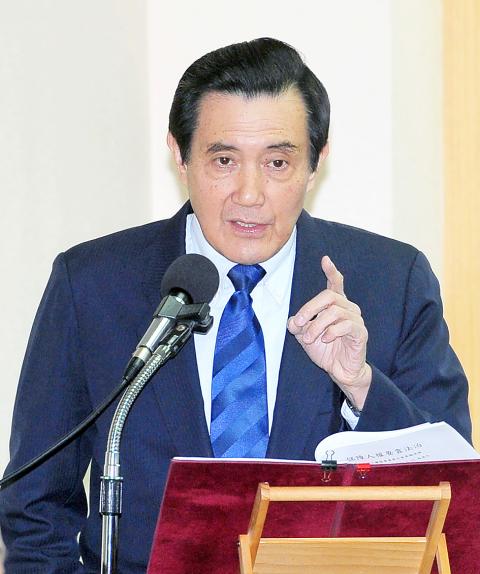Former president Ma Ying-jeou (馬英九) yesterday said political talk show pundits and the Ill-gotten Party Assets Settlement Committee threaten the nation’s rule of law.
While giving a speech entitled “Taiwan’s recent human rights issues — the protection of human rights relies on the rule of law” at the Chinese Association for Human Rights’ general assembly, Ma lashed out at pundits and the committee for harming the rule of law, despite Taiwan’s listing as the second-freest nation in Asia.
Ma said that some media pundits have long been making accusations against, and defaming, government officials in the name of freedom of speech.

Photo: CNA
They have become a special social stratum, to whom the court has been lenient, Ma said, lamenting that certain pundits have made millions of New Taiwan dollars by speaking on talk shows, but are a “negative factor” and “the killer of freedom of speech.”
The legislature’s passage of the Act Governing the Handling of Ill-gotten Properties by Political Parties and their Affiliate Organizations (政黨及其附隨組織不當取得財產處理條例) has also affected the rule of law, Ma said.
The Executive Yuan’s committee has power over the legislative, executive and judicial branches and has been taking questionable actions, including an order to freeze the capital of a particular political party, thereby impeding that party’s normal functioning, Ma said.
While the committee’s aim is for transitional justice, it violates the imperative that a nation operates under the rule of law, namely the principle of non-retroactivity, presumption of innocence, prohibition of bills of attainder and clarity of law, in order to avoid conflicts of interest, Ma added.
He also called into question the legitimacy of legislation concerning party assets, which he said was passed because the Democratic Progressive Party commands a majority in the legislature, without the input of the executive’s departments.
Insofar as Taiwan is considered by the international community a stable democracy, “is there really the need to walk on the path of transitional justice?” he said.
Tackling problems with unconstitutional procedures would not achieve transitional justice; worse, it would probably lead to democratic regression, he added.

ANOTHER EMERGES: The CWA yesterday said this year’s fourth storm of the typhoon season had formed in the South China Sea, but was not expected to affect Taiwan Tropical Storm Gaemi has intensified slightly as it heads toward Taiwan, where it is expected to affect the country in the coming days, the Central Weather Administration (CWA) said yesterday. As of 8am yesterday, the 120km-radius storm was 800km southeast of Oluanpi (鵝鑾鼻), Taiwan’s southernmost tip, moving at 9kph northwest, the agency said. A sea warning for Gaemi could be issued tonight at the earliest, it said, adding that the storm is projected to be closest to Taiwan on Wednesday or Thursday. Gaemi’s potential effect on Taiwan remains unclear, as that would depend on its direction, radius and intensity, forecasters said. Former Weather Forecast

As COVID-19 cases in Japan have been increasing for 10 consecutive weeks, people should get vaccinated before visiting the nation, the Centers for Disease Control (CDC) said. The centers reported 773 hospitalizations and 124 deaths related to COVID-19 in Taiwan last week. CDC Epidemic Intelligence Center Director Guo Hung-wei (郭宏偉) on Tuesday said the number of weekly COVID-19 cases reported in Japan has been increasing since mid-May and surpassed 55,000 cases from July 8 to July 14. The average number of COVID-19 patients at Japan’s healthcare facilities that week was also 1.39 times that of the week before and KP.3 is the dominant

The Chinese Communist Party’s (CCP) working group for Taiwan-related policies is likely to be upgraded to a committee-level body, a report commissioned by the Mainland Affairs Council (MAC) said. As Chinese President Xi Jinping (習近平) is increasingly likely to upgrade the CCP’s Central Leading Group for Taiwan Affairs, Taiwanese authorities should prepare by researching Xi and the CCP, the report said. At the third plenary session of the 20th Central Committee of the CCP, which ended on Thursday last week, the party set a target of 2029 for the completion of some tasks, meaning that Xi is likely preparing to

US-CHINA TRADE DISPUTE: Despite Beijing’s offer of preferential treatment, the lure of China has dimmed as Taiwanese and international investors move out Japan and the US have become the favored destinations for Taiwanese graduates as China’s attraction has waned over the years, the Ministry of Labor said. According to the ministry’s latest income and employment advisory published this month, 3,215 Taiwanese university graduates from the class of 2020 went to Japan, surpassing for the first time the 2,881 graduates who went to China. A total of 2,300 graduates from the class of 2021 went to the US, compared with the 2,262 who went to China, the document showed. The trend continued for the class of 2023, of whom 1,460 went to Japan, 1,334 went to